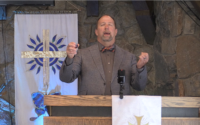The verse ‘Let all things be done decently and in order’ – what does 1st Corinthians 14:40 mean?
The verse ‘Let all things be done decently and in order’ – what does 1st Corinthians 14:40 mean?
Last night at a non-disclosed venue a brother in Christ spoke to me about my open-air evangelism. He advised that my open-air preaching is “unbiblical.” I asked him why so. He specifically spoke about a comment that I made on my Facebook wall yesterday, whereas I advised that while preaching in San Bernardino, I “almost got hit with a large rock, and an unopened can of beer” (video here).
He advised me that if I am preaching in the streets and chaos occurs, or if I’m being “disruptive,” that I am not obeying the verse that says “Let all things be done decently and in order.” I value constructive criticism from my brethren, but let’s take a look at that verse in its proper context.
In the 14th chapter of 1st Corinthians, Paul was speaking to the church in Corinth. Verse 40 (and 39) are a ‘concise summary’ of the entire 14th chapter. Putting that verse into context, Paul had just spoken about ‘spiritual gifts.’
Paul knew that some were zealous to use the gifts, and that they would be troublesome if not used Biblically. Paul reminded them that God was not the author of confusion, but of peace within the body of Christ (or local church setting).
The spiritual gifts Paul had just spoken about were the gift of tongues, the interpretation of tongues, but more specifically the gift of prophecy. Paul was saying that those whom used those gifts then, could only do so if they were done with a proper order of worship. Henceforth chapter 14 ends with verse 40, “Let all things be done decently and in order.”
Paul was not talking about preaching the Gospel in a dark decadent world, he was talking about the local church congregation. More specifically the application of gifts. Brethren if you are preaching the Gospel out in a sinful world, chaos will erupt. Sometimes people curse, mock, and/or heckle the Gospel. Sometimes they will hurt, harm, or even kill you. It happened in the Scriptures, it happened in the early church, and it still happens today.
The above misuse of Gods Word is why an ‘exegetical’ teaching of the Scriptures is crucial, rather than an ‘eisegesis.’ An eisegesis is where we take Gods Word out of context to prove our point. But an exegesis is where we accurately interpret the Text.
“Therefore, my beloved brethren, be ye stedfast, unmoveable, always abounding in the work of the Lord, forasmuch as ye know that your labour is not in vain in the Lord” 1 Cor 15:58).
To know what the Apostle Paul’s attitude was towards other preachers that he did not agree with (excluding false teachings or what’s clearly hate mongering), click here.
Update: Below in comments is a compilation of some excellent ‘iron sharpens iron’ comments to this post, taken from my Facebook.
Add a Comment
You must be logged in to post a comment.




Below in comments is a compilation of some excellent ‘iron sharpens iron’ comments to this post, taken from my Facebook.
———–
Good thing John the Baptist didn’t follow your friends advice.
——–
This is instruction for order inside the church. Interestingly enough most “Christians” who would claim that street evangelism (Luke 14:21-24) isn’t in the bible are reading with blinders on their eyes and are “chicken” of persecution…… God give us strength when the real persecution comes!
———–
They stoned Stephen.. They killed Jesus… and it says in the word that “In fact, everyone who wants to live a godly life in Christ Jesus will be persecuted”. We’re promised persecution and tribulation…
————
Great points Bill. There are other verses that can better be used to prohibit unbiblical means of stirring up anger in others. Its sad that faithful evangelists often get lumped together with the Westboro baptist types.
———-
Oh my about what he said because as I was reading your post it TOTALLY reminded me of how they went to throw stones at Jesus for preaching but he always got away before they could get him. Of course opposition is going to come- that’s what the Gospel brings!
——-
Amen brother Bill. While it is true that some preachers are persecuted for simply being hate-filled and antagonistic in their so-called preaching, I do not see that that is the case with your preaching. Keep up the good work. We read about the persecution of the prophets in the Old Testament, and in the New Testament about the persecution of John the Baptist, our Lord Jesus, and the Apostles and disciples. And we can expect that people will also hate and persecute us for preaching the biblical gospel message of repentance and faith in Christ.
Jesus said the world hated Him because He testified that its deeds were evil (John 7:7).
This is just one of many of examples of our Lord being persecuted for preaching the truth: “So all those in the synagogue, when they heard these things, were filled with wrath, 29 and rose up and thrust Him out of the city; and they led Him to the brow of the hill on which their city was built, that they might throw Him down over the cliff. 30 Then passing through the midst of them, He went His way.”(Luke 4:28-29)
Jesus said to the disciples, “Remember the word that I said to you, ‘A servant is not greater than his master.’ If they persecuted Me, they will also persecute you” (John 15:20).
Stephen was stoned to death for preaching the truth:
“Then they secretly induced men to say, “We have heard him speak blasphemous words against Moses and God.” 12 And they stirred up the people, the elders, and the scribes; and they came upon him, seized him, and brought him to the council. 13 They also set up false witnesses who said, “This man does not cease to speak blasphemous words against this holy place and the law; 14 for we have heard him say that this Jesus of Nazareth will destroy this place and change the customs which Moses delivered to us.” 15 And all who sat in the council, looking steadfastly at him, saw his face as the face of an angel.”…”59 And they stoned Stephen as he was calling on God and saying, “Lord Jesus, receive my spirit.” 60 Then he knelt down and cried out with a loud voice, “Lord, do not charge them with this sin.” And when he had said this, he fell asleep.” (Acts 6:11-15, 59-60)
The Apostle Paul stirred up riots many times as a result of preaching the biblical gospel. These are some examples:
“Then the multitude rose up together against them; and the magistrates tore off their clothes and commanded them to be beaten with rods. 23 And when they had laid many stripes on them, they threw them into prison, commanding the jailer to keep them securely. 24 Having received such a charge, he put them into the inner prison and fastened their feet in the stocks. 25 But at midnight Paul and Silas were praying and singing hymns to God, and the prisoners were listening to them.” (Acts 16:22-25)
“But the Jews who were not persuaded, becoming envious, took some of the evil men from the marketplace, and gathering a mob, set all the city in an uproar and attacked the house of Jason, and sought to bring them out to the people. 6 But when they did not find them, they dragged Jason and some brethren to the rulers of the city, crying out, “These who have turned the world upside down have come here too. 7 Jason has harbored them, and these are all acting contrary to the decrees of Caesar, saying there is another king–Jesus.” 8 And they troubled the crowd and the rulers of the city when they heard these things.” (Acts 17:5-8)
“And about that time there arose a great commotion about the Way. 24 For a certain man named Demetrius, a silversmith, who made silver shrines of Diana, brought no small profit to the craftsmen. 25 He called them together with the workers of similar occupation, and said: “Men, you know that we have our prosperity by this trade. 26 Moreover you see and hear that not only at Ephesus, but throughout almost all Asia, this Paul has persuaded and turned away many people, saying that they are not gods which are made with hands. 27 So not only is this trade of ours in danger of falling into disrepute, but also the temple of the great goddess Diana may be despised and her magnificence destroyed, whom all Asia and the world worship.” 28 Now when they heard this, they were full of wrath and cried out, saying, “Great is Diana of the Ephesians!” 29 So the whole city was filled with confusion, and rushed into the theater with one accord, having seized Gaius and Aristarchus, Macedonians, Paul’s travel companions.”(Acts 19:23-29)
In his defense against the accusations of false apostles Paul told the Corinthians,
“Are they ministers of Christ?–I speak as a fool–I am more: in labors more abundant, in stripes above measure, in prisons more frequently, in deaths often. 24 From the Jews five times I received forty stripes minus one. 25 Three times I was beaten with rods; once I was stoned; three times I was shipwrecked; a night and a day I have been in the deep; 26 in journeys often, in perils of waters, in perils of robbers, in perils of my own countrymen, in perils of the Gentiles, in perils in the city, in perils in the wilderness, in perils in the sea, in perils among false brethren; 27 in weariness and toil, in sleeplessness often, in hunger and thirst, in fastings often, in cold and nakedness”(2Cor.11:23-27).
2 Timothy 2:12 says, “Yes, and all who desire to live godly in Christ Jesus will suffer persecution.”
We really need to get away from this feel good message that deceives many, gains the approval of the world, and convicts no one of sin, righteousness and judgment.
———-
Define “disruptive.”
Acts 21:30-36 KJV ‘And all the city was moved, and the people ran together: and they took Paul, and drew him out of the temple: and forthwith the doors were shut. And as they went about to kill him, tidings came unto the chief captain of the band, that all Jerusalem was in an uproar. Who immediately took soldiers and centurions, and ran down unto them: and when they saw the chief captain and the soldiers, they left beating of Paul. Then the chief captain came near, and took him, and commanded him to be bound with two chains; and demanded who he was, and what he had done. And some cried one thing, some another, among the multitude: and when he could not know the certainty for the tumult, he commanded him to be carried into the castle. And when he came upon the stairs, so it was, that he was borne of the soldiers for the violence of the people. For the multitude of the people followed after, crying, Away with him…’
—————-
Jesus’ teaching was so disruptive that they tortured and murdered Him for it…and then tried to cover up the Resurrection.
———–
I heard a story about a Christian man in the 1800s was evangelizing from town to town and one day he got off his horse and prayed to the Lord am I doing the right thing Lord show me and as he was praying a Gentleman walked by him and thru a Rock at him and told him nobody wants to here your Gospel he thanked the Lord jumped on his Horse and carried on preaching the word of God. (Update: It was John Wesley)
————
Great edification here! The open air preaching – how will they hear unless unless someone tells them–the opposers are not going to go to church to hear the gospel. They won’t be able to say they never heard.
———-
Stephen had a few rocks thrown at him , because he was doing some open-air preaching.
———-
The LORD Jesus got real “disruptive” when He used His whip of cords.”
———–
Jesus will be real disruptive during His great White Throne Judgement.
———-
When they went out preaching they “turned the world upside down” (Acts chapter 17).
————–
The Brits heckled George Whitefield. One of his colleagues was severely beaten.
—————
He is in good company. They stoned Stephen, crucified Peter, James probably beheaded (Acts 12:2), Paul stoned many times, whipped multiple times and finally beheaded, and then there is Jesus. His death was a long ordeal of beatings, whippings then nailed to a cross and suffered not only physically but spiritually as He bore the sins of the whole world. Yes, in good company!
—————–